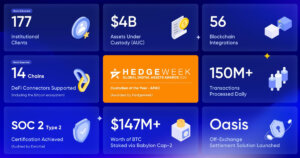 CoinMarketCap’s Twitter poll reveals the problem behind online voting
CoinMarketCap’s Twitter poll reveals the problem behind online voting CoinMarketCap’s Twitter poll reveals the problem behind online voting

Photo by Brett Jordan on Unsplash
After posting a poll asking the community to vote on which crypto project is to receive an infographic, CoinMarketCap found itself in the middle of a war between Cardano and VeChain. With around 15,000 voices cast for VeChain in the final seconds of the poll, the Cardano community accused VeChain of buying votes. However, despite the petty bickering it caused, CoinMarketCap’s poll revealed a huge problem behind any kind of online voting—a lack of an industry-wide identity solution.
A CoinMarketCap poll sparks a war between Cardano and VeChain
Earlier this week, CoinMarketCap posted a poll on Twitter asking its followers to vote on which cryptocurrency should be the next to receive an infographic. But, what started as an interesting proposal quickly turned toxic as people began noticing irregularities in the votes. Despite leading by several percent throughout most of the poll, Cardano was wiped out by VeChain in the last few seconds of the poll, when it recorded a sudden influx of 15,000 votes for VeChain.
Here there @CoinMarketCap here are the screencaps of the last few seconds of the poll closing where @vechainofficial picked up 15,000 votes within a second. Really? What's the verdict?
cc: @IOHK_Charles @Cardano hat tip @EpistleGoguen ? pic.twitter.com/6WxbElp5KA— Rick McCracken (@RichardMcCrackn) November 25, 2020
Most of the Cardano community, including some of its most influential voices, accused the VeChain community of buying votes. These accusations relied on screengrabs that are believed to have originated in the official VeChain Telegram group, which show some community members admitting that they have bought votes.
Credits to @EyeOfTheKing1 pic.twitter.com/9YVhAgtyOt
— Andy Hendrikx (@HendrikxAndy) November 25, 2020
However, petty bickering between the two communities aside, the skewed votes on the poll have actually highlighted a very important problem in the industry—a lack of a comprehensive identity solution.
Atala PRISM to the rescue
Quick to comment on the issue was Charles Hoskinson, the CEO of IOHK, the company behind Cardano. While Hoskinson seemed unbothered about the results of the poll, he took the opportunity to highlight the problem behind any kind of online voting.
“A massive surge of votes out of nowhere right at the end… And this is why we need PRISM,” Hoskinson tweeted. “No more bots and Sybil attacks.”
What Hoskinson is referring to is Atala PRISM, a decentralized identity solution built on Cardano. And while PRISM has many different applications, it’s most promising one is providing identity verification—it offers a decentralized alternative to the issue of digital identity, allowing individuals to control, own, and verify their credentials. When combined with its ability to leverage blockchain to ensure data and product originality, this makes Atala PRISM a perfect facilitator of online voting.
The ability to buy votes online is erased when the only way to vote is with a verified online identity. A simple solution that creates a tamper-proof system that not only protects the identities of the parties involved but also ensures all votes cast are credible and reliable.




 CoinGlass
CoinGlass 

































































































